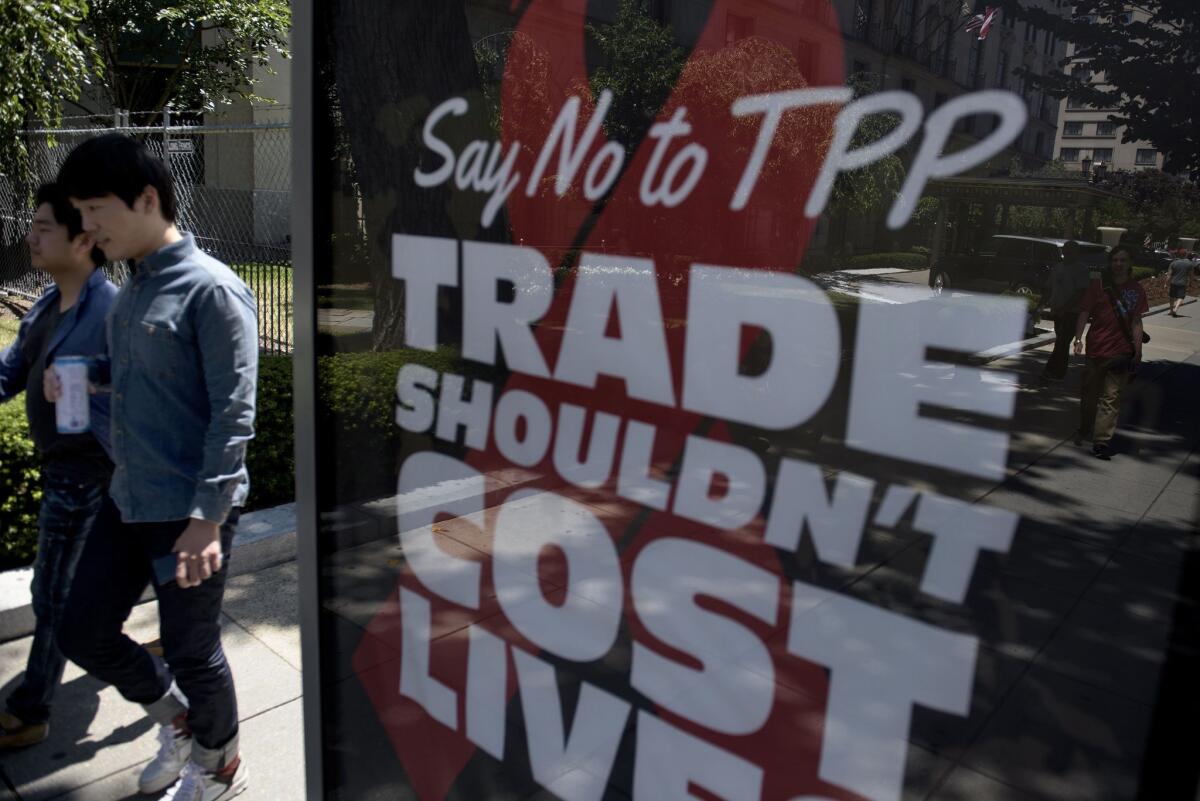Opinion: Will Trans-Pacific Partnership hold back new generic drugs?

People pass an advertisement in Washington, D.C., protesting the Trans-Pacific Partnership.
- Share via
The Times’ editorial board, which has long supported free-trade deals, sounded a note of caution Friday about the next one in the pipeline, the Trans-Pacific Partnership.
“The Obama administration’s goal has been to persuade its trading partners to move toward U.S. standards in these areas, which tend to be more demanding than their own,” the board wrote. “But it’s important that the deal not undermine carefully crafted U.S. policies by advancing only selected parts of U.S. law.
So what should the public be looking for if and when the deal is completed? (Be patient -- a deal that once seemed imminent doesn’t appear to be so close now, and the text may not become public until weeks after the talks conclude.) One possibility is a combination of U.S. and foreign requirements that winds up changing the competitive balance.
That’s what generic drug makers, among others, fear when it comes to a new class of medicines called biosimilars, which are less-expensive versions of biologically produced drugs. Under U.S. law, biologic drug makers have a 12-year exclusive right to the research they conduct on the safety and effectiveness of their products. Within that 12-year period, all other drug makers would have to submit data from their own safety and efficacy studies to win approval of a biosimilar version. That’s a pretty effective barrier to competing versions entering the market.
That exclusivity is longer than any of those in other TPP countries. It’s also longer than the Obama administration and some lawmakers want it to be; they’ve proposed cutting the U.S. period to seven years, largely to cut the cost of Medicaid, Medicare and other health programs.
Now here’s where the TPP comes in. According to leaked drafts of the agreement, the United States has been pushing the other nations to extend data exclusivity for biologic drugs in their countries to 12 years. That would not only make it considerably harder to shorten the U.S. exclusivity period, but also slow the introduction of more affordable forms of these medicines in poorer countries in the Pacific region.
On top of that, the deal may extend a concept called “patent linkage” to biologics. In U.S. law, patent linkage stops the maker of a conventional generic pharmaceutical from selling it until any disputes over patent infringement are resolved.
Three TPP countries -- but not the United States -- also apply patent linkage to biosimilars. If such a rule were included in the TPP, Congress would have to add it to U.S. law to avoid sanctions from international arbiters.
The combination of patent linkage and 12 years of data exclusivity would be tough for biosimilar drug makers, but at least U.S. laws also include a number of provisions that encourage the use of approved biosimilars -- for example, the ability of doctors and pharmacists to substitute biosimilars for branded biologic medicines if regulators deem them to be interchangeable. Generic drug makers worry, though, that the TPP won’t include such provisions, tipping the competitive balance in favor of branded biologics.
Top U.S. negotiators have declined to comment on specific provisions of the agreement, which are still being hammered out. In general, though, they’ve said that they are trying to maintain the balance found in U.S. law, and to craft different rules for each country to recognize their different stages of development.
Follow Healey’s intermittent Twitter feed: @jcahealey
More to Read
A cure for the common opinion
Get thought-provoking perspectives with our weekly newsletter.
You may occasionally receive promotional content from the Los Angeles Times.










